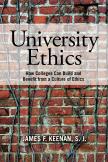The Commodification Curse: review of ‘University Ethics,’ by James F. Keenan, S.J.
The paradox that lies at the heart of University Ethics, by James F. Keenan, S.J., is this: American universities have medical schools that teach medical ethics, pharmacy schools that teach pharmaceutical ethics, law schools that teach legal ethics, nursing schools that teach nursing ethics but no schools that teach university ethics. At the center of the university’s moral mass there is a black hole.
Why is this? How can universities divide up the teaching of ethics school by school and not understand that none of this makes any didactic sense unless the students being taught a localized ethical system perceive the university itself as a moral actor, with a controlling ethical vision of its own? Keenan’s basic answer is that the people who lead universities do not seem to notice this lacuna or, worse, they do not seem to care.
Every day one newspaper or another in the United States, not to mention the Internet, has a story about campus hazing, campus sexual assault, cheating, racial or sexual discrimination on campus, fraternity misbehavior, absurd levels of student debt upon graduation and the sad saga of the underpaid adjunct professor. There is, to put it mildly, a surfeit of ethical issues facing our campuses that would seem to require a campus-wide ethical system in response.
So why do our universities not teach and practice university-wide ethics? Keenan’s answer is that we still run universities in the United States on a feudal basis, with administrative fiefs and educational (school and department) fiefs and student life fiefs and athletic (sport by sport) fiefs, each highly structured in top-down fashion and each disinclined to acknowledge the need for campus wide ethical practices that might upset that hierarchy. Witness that when there were problems at Penn State University with the sexual abuse of children, the problems stayed inside the silo of the athletic department, and that even when the university central administration was made aware, they deferred to the athletic department’s do-nothing solution. Keenan asks why the university would not see the matter as an ethical issue and solve it using ethical principles common across every part of the university.
Or take the rampant problems of gender and racial bias at our universities, which Keenan deals with in depth. Why is there such a dearth of female and racial minorities at the leadership of American universities? Might that be because there is a dearth of female and minority faculty members? And why are these not seen as ethical issues that require an ethical solution?
One reason, which Keenan does not cite, might be the dearth of women and minority members on university boards of trustees. As the author points out, universities are places of privilege and self-importance, and no one at a university is more privileged or self-important than the wealthy donors who get to sit on the university board. Board members tend to choose university presidents from among those who are like themselves, and these presidents then pick senior administrators and deans who tend to resemble them, and so it goes, down through the system, with new faculty hires reproducing the existing faculty.
About the only place on campus where Keenan does not see this system of privilege being perpetuated without ethical question is in the universities’ search for a diverse student body. But then, he points out, why would a diverse student want to come to a university where the university’s restricted culture and leadership composition would make them feel out of place? And why is this not seen as an ethical issue requiring an ethical solution by our universities?
The fabric that Keenan sees unifying all of these threads is what he calls the commodification of the university, by which he means the treatment of education as a commodity to be purchased rather than an acquisition of knowledge to be experienced.
On this point, Keenan is dead right. Commodification, which has led to the building of Taj Mahal residence halls and recreation centers to attract students, which has led to the huge expansion of admissions and other administrative staff, which has led to the cutting of educational costs in order to be able to afford these higher administrative expenses, which has led to the growth of ill-paid and ill-treated adjunct faculty (now accounting for more than half the hours taught in all American universities) in order to save money, lies at the center of all of the ethical issues facing our universities. But absent recognition by the university that it cannot teach ethics without consciously practicing them, we are back in that black hole again.
Keenan’s work is multilayered, analytically sharp and engaging, and demonstrates not just the depth of his research but his own personal experience as a university professor. Being one of those myself, as well as a former university administrator, I found myself nodding in recognition at his diagnosis. Luckily, he also provides the cure: the creation of a universitywide ethical system that universities both teach and practice. If you have anything to do with the life of a university, even if you are simply a concerned alumnus, get this book. The patient cannot wait much longer for the cure.
This article also appeared in print, under the headline “The Commodification Curse,” in the March 28, 2016, issue.








